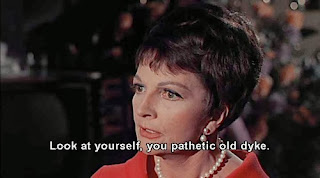Alcoholic, paranoid and nearly desperate at the thought of losing her long-running role on a BBC TV series, an aging actress lashes out at the world in general, and her much-younger female lover in particular. It’s a plot pregnant with dramatic possibilities, and The Killing of Sister George (1968) explores them all in frank and often explicit detail.
“Not all girls are raving bloody lesbians,” young Alice tells her jealous lover during one of their many altercations, but in this film’s insulated world, the vast majority are. This is far from just a movie about homosexuality, however. It’s a cautionary tale about the cutthroat world of show business and the terrors of growing old and being alone, set against the backdrop of the swinging mod London of the late 1960s and seen through the lens of sharply drawn female archetypes.
 |
| Beryl Reid in the title role |
Directed by the legendary American auteur Robert Aldrich and based on the stage hit by British playwright (and theater critic) Frank Marcus, Sister George is as absorbing in its portrayal of the cynical world of TV production, where bustling, behind-the-scenes backstabbing is the bill of fare at the BBC, as it is when exploring the intimate moments of women in love and in conflict.
As June Buckridge, aka Sister George, the beloved spinster character she plays on Applehurst (think Coronation Street or East Enders), Beryl Reid is at turns humorous, tragic, wistful, spiteful, warm and outrageous, but always compelling and endearingly human. Reid, a one-hit wonder whose film career never took off despite this legendary performance, commands the screen with her fully realized and in-depth characterization. Though the film, with its then-considered-unsanitary subject matter, was shunned by the Oscars (Oliver! was chosen that year’s Best Picture), Reid did receive a Golden Globe nomination as Best Actress for her tour de force portrayal.
 |
| Susannah York as Alice |
The beautiful Susannah York aces the difficult role of Alice, the child-woman who chafes against George’s smothering and mood swings yet plays Virginia Woolf-worthy mind games herself and is not as innocent (or young) as she professes. The minute she meets the successful BBC program director Mrs. Croft (who pays a visit to George to rake the actress over the coals for unprofessional behavior), Alice makes plans to hitch her wagon to the high-powered lady executive and ditch her falling soap opera star lover. With her pixie hairdo (the rage of 1968 for gamines like York, Goldie Hawn and Mia Farrow) and soulful doe eyes, York’s performance is a skillful blend of intensity and vulnerability.
 |
| Coral Browne as Mercy Croft |
The smug, uptight and terribly upper-crust BBC program director Mercy Croft is played with venomous finesse by the versatile character actress Coral Browne, best known for her iconic role as Vera Charles in Auntie Mame (and as the wife of the great Vincent Price). But here, as the frosty middle-aged widow whose latent tendencies are stimulated by George’s pretty blond flatmate, Browne is given her juiciest role ever, culminating in one of the most startling and searing sex scenes ever put on mainstream film up to that time. Far from a Penthouse soft-focus girl-on-girl fantasy, the love scene between the older and younger woman, as staged by Aldrich under unforgiving lighting in unrelenting close-up, is as much a ghoulish nod to his grand guignol roots (Whatever Happened to Baby Jane and Hush, Hush, Sweet Charlotte) as it is unexpected eroticism.
Chock full of irony and wit, not to mention loads of bitchy and catty repartee, Sister George is the female version of Boys in the Band, ground-breaking for its time and still eminently watchable.





Loved this post! And so happy you wrote about a film that fascinated me when I was young, but was one of the few racy films of that era that my parents knew enough about to forbid me to see it.
ReplyDeleteI often wonder what I would have made of it had I seen it when I wanted to (11 years old). I certainly would have found the relationships complex, and i agree with you about how unromantically the sex scene is shot. It's really rather jarring in its lack of discretion. it really must have made 60s audiences squirm.
Seeing the screenshots makes me want to revisit this film again. It's been years.
Thanks for highlighting another fave!
Cheers, Ken! How sweet and lovely of your parents to shield you from this picture, so explosive for its time, and bound to be the source of a million questions from a a bright and beautiful young film lover--a million questions I am sure they didn't have the answers to, not even in liberal San Francisco!
ReplyDeleteThe mid to late 60s really saw the whole face of film change dramatically, dealing with stuff that most "decent" people would never think about, let alone talk about. It must have been a strange time for our parents' generation, trying to raise precocious folk such as us!!
By all means, see it again. It's timeless. Well-written, well-acted, and universal and truthful in its treatment of the human experience.